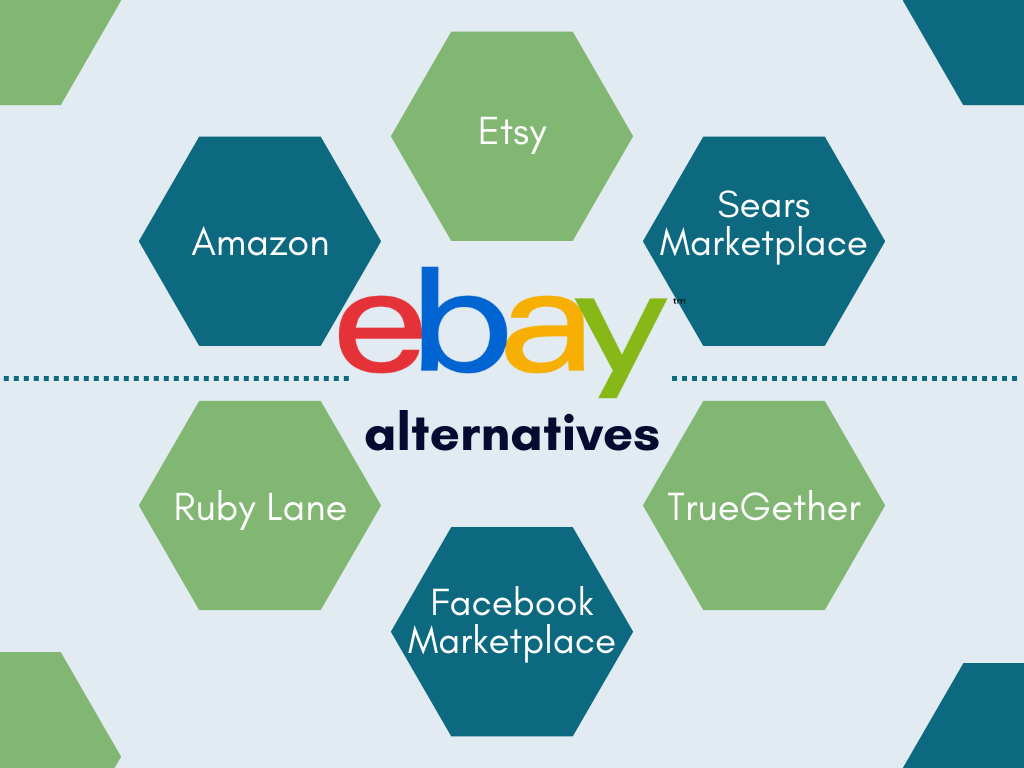In the diverse landscape of ecommerce, businesses often find that traditional platforms like eBay may not fully align with their specific needs due to competition and cost factors. This article delves into exploring alternatives to address these limitations and provides a comprehensive overview of their features, drawbacks, and fee structures.
Introduction to eBay and its role in ecommerce
eBay, an online marketplace giant, has transformed the way individuals and businesses engage in buying and selling goods. It has emerged as a diverse platform hosting a wide array of products, ranging from electronics to rare collectibles, catering to a broad spectrum of sellers and buyers. Despite its widespread popularity and significant market presence, eBay might not be the optimal solution for all types of businesses, prompting many to explore alternative platforms due to varying business requirements and the evolving dynamics of the market.
eBay has been a pioneer in facilitating ecommerce transactions, providing a user-friendly interface that empowers sellers to reach a vast global audience. The platform’s auction-style selling, fixed-price sales, and extensive categories for product listings have made it a go-to destination for both seasoned and novice sellers. Its services extend beyond individual sellers, supporting small to medium-sized businesses in expanding their reach and sales volume.
Benefits to sell online on eBay
- Global reach
eBay’s international presence allows sellers to access a worldwide customer base, fostering cross-border trade and reaching markets that might otherwise be challenging to access. - Diverse product categories
With a vast spectrum of product categories, sellers can list a wide range of items, from vintage clothing to brand-new electronics, catering to a broad array of consumer needs. - Ease of use
eBay’s platform is user-friendly, offering a straightforward listing process, accessible customer support, and various tools to enhance the selling experience. - Auction and fixed-price options
Sellers have the flexibility to choose between auction-style listings or fixed-price sales, catering to varying product types and sales strategies. - Seller protections
eBay provides seller protections and resolution mechanisms in case of disputes, ensuring a level of security for sellers.
Why businesses seek alternatives to eBay to sell their products
Despite its strengths and vast user base, eBay might not align with the unique needs and goals of all businesses, particularly smaller or newer ventures. The intense competition and fee structure could significantly impact profitability, prompting sellers to explore alternative ecommerce platforms better suited to their specific niche, target audience, and operational requirements. Let’s look at the reasons why might businesses look for eBay alternatives in more detail.
Competition and seller visibility
- Challenges for newer or smaller businesses
With millions of sellers populating the platform, standing out can be a significant challenge, especially for newer or smaller businesses. The competition can make it difficult to gain visibility and attract potential buyers, affecting sales and growth prospects. - Fees and costs impacting profit margins
eBay fee structure comprises a listing fee, final value fees, and additionally, eBay charges a seller fee for optional features, which can impact profit margins, especially for smaller businesses operating on tighter budgets. The cumulative effect of these fees can significantly reduce the earnings for sellers, especially for lower-priced items or high-volume sales.
Exploring eBay alternatives
As you can see, eBay continues to be a significant player in the ecommerce industry. But, as stated above, not all businesses that sell online consider it the optimal solution for their particular needs. Therefore, many enterprises are searching for alternative ecommerce platforms that better suit their requirements, help them expand their online sales, and diversify their market presence.
Let’s look at several eBay alternatives that cater to varying business models and market preferences in more detail.

Amazon – the most popular eBay’s alternative
Amazon stands as a powerhouse in the ecommerce industry, offering an extensive range of products across multiple categories, from everyday essentials to specialty items. The platform’s robust infrastructure and logistical prowess have cemented its reputation as the go-to marketplace for buyers seeking a wide selection and prompt shipping.
If you’re into sustainable ecommerce, you might want to explore ethical, sustainable, and eco-friendly alternatives to Amazon.
Features and Benefits
- Immense seller visibility
Amazon provides sellers with unprecedented visibility, leveraging its extensive customer base and robust marketing tools to enhance product visibility. The platform’s algorithm-driven recommendations further amplify sellers’ exposure to potential buyers. - Fulfillment by Amazon (FBA)
FBA service streamlines logistics for sellers, offering hassle-free storage, packaging, and shipping. It allows businesses to focus on sales and product development while Amazon manages the operational complexities.
Potential drawbacks
- High competition and algorithm complexity
Competing on Amazon necessitates understanding and mastering complex algorithms that drive product visibility. High competition within the platform makes it challenging for newer or smaller businesses to stand out among a sea of established sellers. - Impactful seller fees
Amazon’s fee structure can significantly impact profit margins. The referral fees, variable closing fees per item sold, and subscription fees for different seller tiers contribute to the overall cost of selling on the platform.
Seller Fees and Pricing Structure
Amazon charges referral fees for each item sold, which vary by category, impacting the overall cost of sales. It also has variable closing fees that are imposed per item sold and are dependent on the item’s category and selling price. Besides, Amazon offers different seller tiers, each with a subscription fee. These tiers offer varying benefits and tools, with associated costs impacting the overall profitability of sellers.
Etsy – a marketplace for artisan sellers
Etsy distinguishes itself as a unique marketplace specializing in handmade, vintage, and distinctive goods, creating a haven for a community of buyers seeking one-of-a-kind items. The platform particularly advocates for and supports small-scale artisans and creators, providing a platform for them to showcase their craft and reach a discerning audience of consumers seeking special, personalized products.
Features and benefits
- Niche market for artisanal products
Etsy offers a specialized market focusing on handcrafted, vintage, and artisanal goods, fostering a community-oriented shopping experience for buyers seeking unique and personalized items. - Community-oriented shopping experience
The platform’s emphasis on handmade goods attracts consumers looking for authentic and individualized products. The interactive and engaged community adds value to the shopping experience, fostering a sense of connection between buyers and sellers.
Potential drawbacks
- Limited audience for mainstream products
Etsy’s specialized focus on unique and handmade items might limit the platform’s appeal for businesses aiming to sell more mainstream or mass-produced goods. This might pose a challenge for sellers looking to reach a broader market. - Fees and competition in the niche
The fee structure on Etsy, combined with the competitive nature of the niche, can significantly impact sellers. This might be a concern for businesses operating on tighter profit margins or those experiencing high competition within the platform.
Seller fees and pricing structure
Etsy imposes a fee structure comprising listing fees, transaction fees, and payment processing fees. These fees can affect the profitability of sellers, influencing their overall earnings and impacting the pricing strategies for their products.
Sears Marketplace
Sears Marketplace stands out as a notable eBay alternative, functioning as an extension of the renowned department store chain, Sears. This online platform offers a gateway for businesses to access a broad customer base, specializing in the sale of electronics, appliances, and tools. Leveraging the strong brand recognition associated with Sears, the marketplace attracts customers who are familiar with and trust the Sears brand.
Benefits for sellers
- Robust brand recognition
Leveraging the established Sears brand allows sellers to access a customer base that is already comfortable and acquainted with Sears, providing a sense of trust and reliability. - Product visibility and customer base
The marketplace emphasizes product visibility, allowing sellers to tap into an existing customer base, potentially increasing sales and brand exposure. - Inventory management and analytics
The platform offers tools and features that aid in inventory management and provide sellers with analytical insights. This can enhance operational control and decision-making for businesses.
Potential drawbacks
- Higher fees
While the marketplace provides substantial brand recognition, its fees might be higher compared to other platforms, potentially impacting the profit margins of sellers, especially smaller businesses. - Limited audience reach
Unlike broader-reaching platforms, this one might have a more restricted audience due to its focus on specific product categories, limiting the potential customer reach.
Seller fees and pricing structure
The platform operates on a fee structure that includes a subscription fee along with category-based commission rates. These rates can vary between 6% and 20%, impacting the overall profitability of sellers based on the products and categories they sell.
In essence, the marketplace offers online businesses a niche space for dealing in electronics, appliances, and tools, leveraging the trust and recognition associated with the Sears brand. While it provides an advantageous customer base and tools for sellers, the fees and more limited audience reach might make some businesses explore alternatives like eBay for broader market access and potentially lower costs.
Ruby Lane
Ruby Lane stands as a distinctive gem in the realm of ecommerce, offering a tailored experience for both buyers and sellers within the antique and vintage goods market. As a specialized online marketplace, Ruby Lane attracts a specific audience passionate about rare and unique items, fostering a community of discerning shoppers and sellers with a penchant for history and collectibles.
Benefits for sellers on Ruby Lane
- Targeted audience
For sellers dealing in vintage or collectible goods, Ruby Lane provides an ideal platform. Its niche audience seeks specialized, one-of-a-kind items, creating a unique opportunity for sellers to connect with buyers genuinely interested in their offerings. - Quality standards
Ruby Lane’s stringent quality standards ensure that only genuine, high-quality vintage and collectible items are showcased. This commitment to authenticity not only provides buyers with confidence but also enhances the reputation of the sellers and the platform itself. - Curated shopping experience
The platform’s layout and design evoke the ambiance of strolling through a specialty boutique. This curated experience resonates with buyers looking for a more personal and unique shopping encounter, distinguishing it from larger, more generalized marketplaces. - Community engagement
Ruby Lane fosters a community-driven environment, promoting interaction and discussions around vintage and collectible items. This engagement can lead to higher customer loyalty and repeat business for sellers.
Drawbacks and considerations
- Limited audience reach
The specialized nature of Ruby Lane, while advantageous for niche products, can limit the potential audience compared to broader platforms like eBay. - Stringent quality standards
While beneficial in maintaining authenticity, the stringent standards can sometimes pose a challenge for sellers, especially those new to the platform or dealing with diverse inventory.
Seller fees and pricing structure
Ruby Lane operates on a tiered commission fee structure, where sellers pay a monthly fee based on their shop tier, coupled with a transaction fee ranging from 6.7% to 15%. This fee structure, while reflecting the platform’s commitment to quality and service, can impact profit margins, especially for smaller businesses or those with lower-priced items.
Ruby Lane continues to be a beacon for sellers dealing in vintage and collectible items, offering a niche marketplace catering to enthusiasts seeking unique and high-quality items. However, while it brings substantial benefits, it’s essential for businesses to consider the trade-offs and align their goals with the platform’s specific offerings when seeking alternatives to broader marketplaces like eBay.
Facebook Marketplace
Facebook Marketplace represents a vast digital platform within the social media giant, where users engage in buying and selling activities within their local communities. Leveraging Facebook’s extensive user base, this platform provides an opportunity for individuals and small businesses to connect with a localized audience.
Features and benefits
Facebook Marketplace is strategically integrated within a platform that billions of users are already familiar with. The localized nature of this marketplace promotes in-person transactions, especially suitable for selling secondhand goods, unique items, or goods that benefit from local trade. It offers a convenient and familiar environment for both buyers and sellers to engage in commerce.
Benefits to Sellers
- Localized visibility
The platform’s emphasis on local selling can be advantageous for businesses looking to target a specific geographic area or connect with buyers within a particular region. - Ease of use
Sellers benefit from a user-friendly interface and the seamless integration with Facebook, making it easy to create listings and connect with potential buyers. - Community engagement
Facebook Marketplace fosters community interaction, allowing sellers to engage directly with buyers and build a sense of trust through their profiles. - Cost-effective
Individual sellers can utilize the platform at no cost, making it an attractive option for those who want to test the waters without a significant financial investment.
Potential drawbacks
While the emphasis on local selling is a distinct advantage, it can be a limitation for businesses aiming for a wider audience. The absence of robust seller protections and customer service might pose concerns for businesses, especially when dealing with higher-value items or in case of disputes.
Seller fees and pricing structure
Facebook Marketplace is typically free for individual sellers to list their items. However, the platform offers optional promotional tools at an additional cost, allowing businesses to increase visibility for their listings through paid advertising or sponsored posts.
TrueGether
TrueGether, a relatively new entrant in the ecommerce space, positions itself as an alternative online marketplace aiming to provide a unique and user-friendly experience for buyers and sellers. The platform distinguishes itself by combining the features of social media and ecommerce to create a more personalized shopping experience.
Benefits to sellers
- Integrated social commerce
The platform integrates social networking aspects into the buying and selling process, allowing for increased interaction between sellers and buyers. This can potentially enhance customer engagement and build trust. - Lower fees
One of the platform’s advantages is its claim of lower selling fees compared to other major marketplaces. This can be an appealing factor for sellers looking to maximize profits. - Ease of use
The platform is designed with a simple and user-friendly interface, making it accessible for sellers of various experience levels. - Multiple selling options
Te marketplace offers both fixed-price and auction-style selling options, providing flexibility for sellers to choose their preferred method of sale.
Potential drawbacks
- Limited visibility
Being a newer platform, it might have a smaller customer base compared to more established marketplaces, potentially limiting the visibility of listed products. - Competition
With its growing popularity, the platform still faces strong competition from larger, more recognized ecommerce platforms, making it challenging for sellers to gain traction.
Seller fees and pricing structure
TrueGether’s fee structure is relatively straightforward and claims to be more seller-friendly compared to some other major ecommerce platforms. While the platform doesn’t charge listing fees, it applies a modest commission fee of around 2.95% for each sale. Additionally, it provides an optional premium subscription service that allows sellers to access advanced features for a monthly fee.
The platform’s fee structure, especially the low commission rate, might be an attractive feature for sellers seeking to minimize their costs and optimize their profit margins. However, the relatively smaller audience size might impact the overall sales volume, thus necessitating a careful evaluation by sellers based on their specific business goals and target customers.
Choosing the right eBay alternative for your business
Selecting an appropriate ecommerce platform for your business is a crucial decision that significantly influences your online presence, sales strategy, and overall success in the digital marketplace. The right platform aligns with your business goals, target audience, and operational requirements, ensuring a seamless and profitable online venture.
Factors to consider when choosing an ecommerce platform
- Integration with payment systems
Seamless integration with preferred payment systems ensures smooth transactions and a convenient shopping experience for customers. Look for platforms that support a wide range of payment gateways, allowing customers to choose their preferred payment method. - Integration with accounting systems
Compatibility with accounting software is vital for efficient financial management, enabling businesses to track sales, expenses, and profits accurately. Seek platforms that offer integrations with popular accounting software, allowing real-time synchronization of sales data, inventory, and financial information. - Target audience suitability
Understanding the platform’s audience is crucial for aligning your product offerings with the preferences and habits of potential customers. Choose a platform that caters to your target demographic and aligns with the nature of your products or services. - Seller fees and cost considerations
Evaluating the fee structure of each platform is essential to ensure it aligns with your business budget and profitability goals. Consider the listing fees, transaction fees, subscription costs, and any additional charges associated with the platform. - Niche suitability and specialization
Some platforms specialize in particular niches or product types. Assess if your business aligns with the specialization of the platform to maximize visibility. Choose platforms that cater to your specific products or services, ensuring you stand out in a market tailored to your offerings. - Marketing and promotional support
Platforms offering robust marketing tools and promotional support can significantly aid in increasing visibility and driving sales. Look for platforms that provide marketing assistance, such as ad campaigns, SEO optimization, and social media integration.
Embracing an omnichannel experience
Given the nature of ecommerce business, an omnichannel approach is often preferred. This involves utilizing more than one platform to reach diverse customer segments and maximize sales potential. However, managing multiple platforms requires efficient integration to ensure a unified and cohesive system.
Businesses benefit from ensuring all their sales channels can integrate into a single system. This integration, including accounting integration, provides a comprehensive and real-time view of sales, finances, inventory, and customer data across all platforms. This allows for more efficient business management, effective decision-making, and a seamless customer experience irrespective of the sales channel they engage with.
Conclusion
Undoubtedly, exploring eBay alternatives has become a priority for many sellers seeking a platform that caters more precisely to their business model. eBay, a dominant force in e-commerce, may not be the ideal alternative for every seller due to its distinct fee structures and established market dynamics. The quest for an eBay alternative has led to the discovery of platforms like TrueGether, Bonanza, and others that offer different approaches to selling. Comparison of these eBay alternatives highlights the unique appeal and challenges each presents.
TrueGether, unlike eBay, boasts a more seller-friendly commission model, foregoing listing fees while offering a personalized social commerce experience. Bonanza, another eBay alternative, presents its marketplace as a venue for unique items, focusing on creating a community-driven selling atmosphere. Sellers looking to move away from eBay’s more rigid structure might find these eBay alternatives more adaptable and cost-effective, particularly in terms of lower listing fees and varied selling models.
When deciding on eBay alternatives, making a direct comparison between these platforms unveils a diverse array of benefits and drawbacks, prompting sellers to weigh their options carefully. This process involves considering not only the absence of listing fees but also the potential impact on product visibility, seller experience, and overall profitability. Through a comprehensive understanding of these alternative platforms and their unique selling propositions, sellers can make informed decisions that better align with their specific business strategies and goals.
This guide is, of courыe, not a comprehensive list of eBay alternatives, there are far more out there (like Bonanza, for instance, etc.). Still, we hope that it might inspire you to search for a perfetct fit for your business, as you know that many options exist on the market, and you have a choice.


![Accounting Security and Data Accessibility in Accounting [2024]](https://synder.com/blog/wp-content/uploads/sites/5/2024/04/how-to-balance-accounting-security.png)


